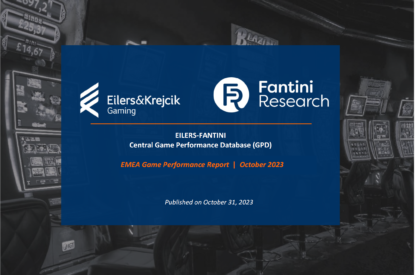Operator News
US – Eilers & Krejcik study shows online gaming boosts rather than cannibalises land-based casinos
By Phil - 16 February 2024
iDEA Growth (iDevelopment and Economic Association), the leading trade association for online gaming in the US, has commissioned groundbreaking research from Eilers & Krejcik Gaming (EKG), which reveals that, in addition to adding a revenue stream for land-based casino operators, iGaming helps boost revenue from operators’ brick-and-mortar properties.
As part of the project, the EKG team dissected a research note by Deutsche Bank, which overlooked some key factors, and a study on iGaming by The Innovation Group, which used a flawed methodology when considering potential cannibalization. The 32-page EKG report “Comparing Online and Land-based Casino Gaming” is the most comprehensive research projects ever conducted on the effects of the introduction of online gaming on the land-based casino industry.
iDEA Founder and General Counsel Jeff Ifrah commented: “This study offers compelling evidence that online gambling is a catalyst for growth, not a competitor to land-based casinos. The research underscores the conviction that legalising it drives beneficial economic impact across the industry. As lawmakers consider the merits of legalizing and regulating iGaming, they can be assured that it will complement the land-based casinos to deliver even more tax revenues to their states and establish meaningful consumer protections.”
The in-depth study of online and land-based casino revenues reveals an average quarterly revenue boost of 2.44 per cent from the introduction of iGaming across the six US states that have regulated the activity.
The EKG team of economists, data analysts and industry experts compared the quarterly growth rates of the six states that have legalised iGaming with a selection of land-based only casino states. They found that five of the six iGaming states outperformed the land-based group over the same time periods.
“The closer you look at the data, the better it is for the casino markets that have added iGaming,” commented Eilers & Krejcik Gaming Managing Director Matt Kaufman. “Nearly all states with mature casino markets have experienced land-based casino declines this century. States that have introduced iGaming have been materially more likely to see that decline flattening, and at times even returning to growth, compared to states with only land-based casinos.”
The report analyzed data from casinos, regulators, and state governments over a 16-year period to assess the impact of iGaming introduction on land-based casino revenues. It found that online casinos have a positve impact on land-based casino revenue (gross gaming revenue, or GGR). We compared the growth rate of land-based casino revenue before and after the introduction of iGaming in all six states, which currently operate land-based and online gaming. All six states showed a positive impact on land-based casino revenue from the introduction of online casinos, with an average quarterly revenue increase of +2.44 per cent.
Casino markets with iGaming performed better than land-based-only casino states. In each of the six states with land-based and online casinos, the report compared their revenue performance before and after their respective introducions of online casinos with the performance of seven other states where only land-based casinos operate. Five out of those six states outperformed the land based-only states in terms of their directional change using the same time periods.
It also found that online casinos atract different customers vs. land-based casinos. Online casino players tend to be moderately younger and are more likely to be male than patrons of land-based establishments. Online casinos grow the overall tax revenue collected by states – and not just because of
new online revenue. Land-based casino revenues have been positively impacted by the introduction of online casinos, which atract a different demographic to the property.
The report arbitrarily compares performance between 2019 and 2022 for all states regardless of when they introduced online casinos. For example, New Jersey and Delaware launched online casinos in 2013. In our view, any potential cannibalisticc effect of online casinos would have happened well before 2019.
Four states included in the study launched online casinos after the start of the 2019 comparison period, meaning some portion of the change in performance happened before the existence of online casinos in those markets. For example, the study shows online revenue declined by $139m between 2019 and 2022 in Connecticut. Our analysis shows that 83.4 per cent of that decline happened by 2021 and online casinos were not even available until October of that year.
The EKG team also used advanced mathematical modeling techniques to study the potential impact of the introduction of iGaming in land-based casino states that have yet to legalize the online channel. They concluded that the typical state would boost casino revenue by 1.7% annually after introducing iGaming.
The timely study comes as state lawmakers in the Maryland House and Senate meet to discuss iGaming legislation at the end of the month.
“iDEA welcomes these findings so that the debate around iGaming is centered on real facts and data. This study bolsters our advocacy efforts in key states, and we look forward to sharing the information with policymakers,” said Ifrah.
The section of the report that focuses on previous studies concluded that the Innovation Group study and the Deutsche Bank research note contained several methodological flaws. Both failed to compare the time periods before and after each state launched online casinos – an obvious limitation if the goal is to study the impact of online casino introduction.
The EKG methodology looks at the impact of online casinos on land-based casino revenue in each state that has launched online casinos individually. This is a much more intuitive approach that shows online casinos have positively impacted land-based revenue.
The Innovation Group’s study for the Maryland Lottery attempted to establish a baseline figure for how land-based casino revenue in iGaming states should have grown during the time frames they studied – but that baseline used arbitrarily chosen time periods, double-counted population growth, and included children as part of the population change of potential gamblers.
The Eilers & Krejcik Gaming report ‘Comparing Online and Land-based Casino Gaming’ was prepared for iDEA. The full report can be found online here and a two-page summary here.





